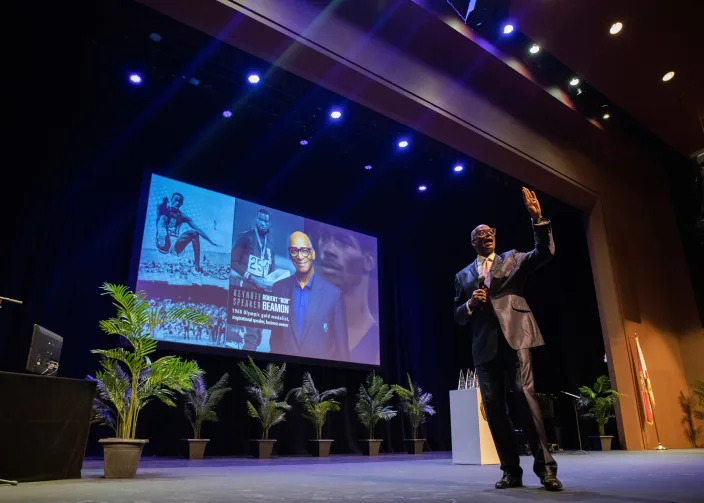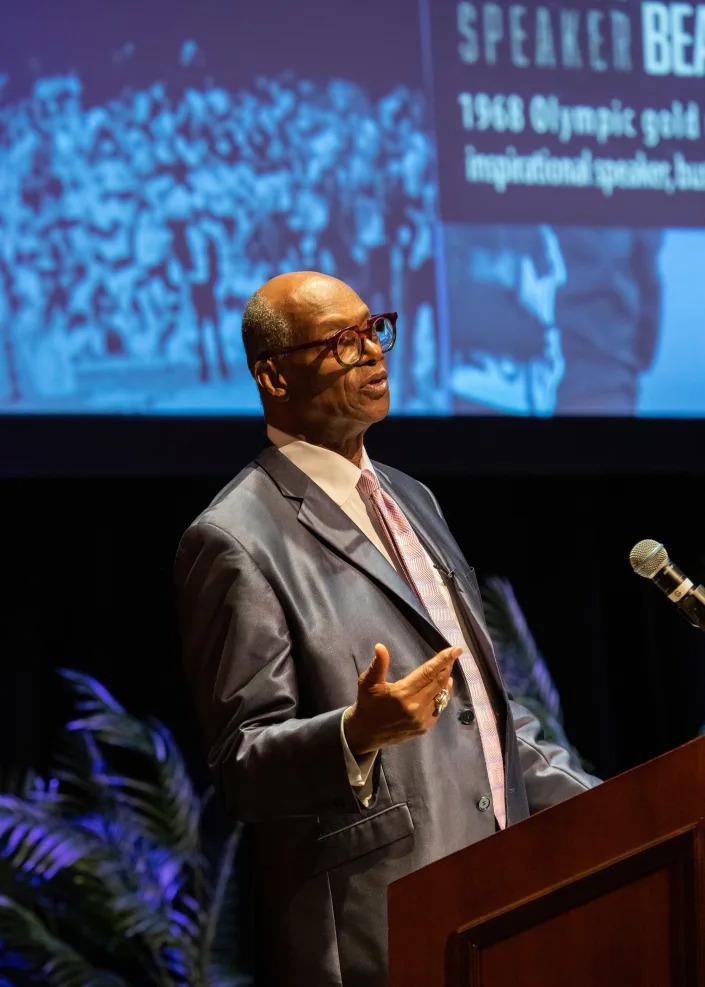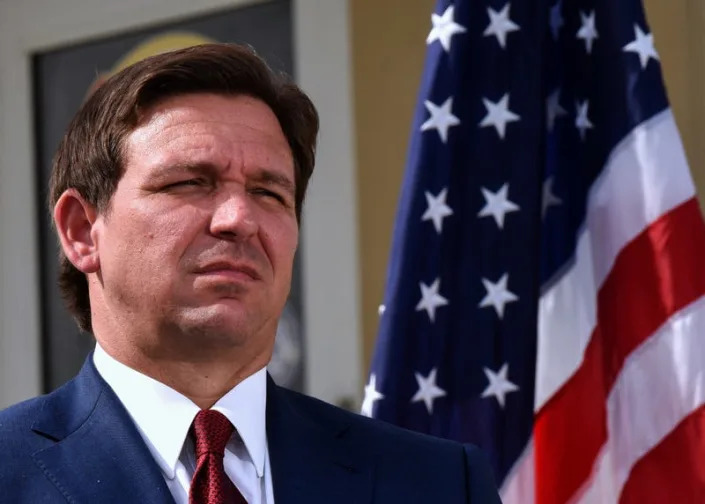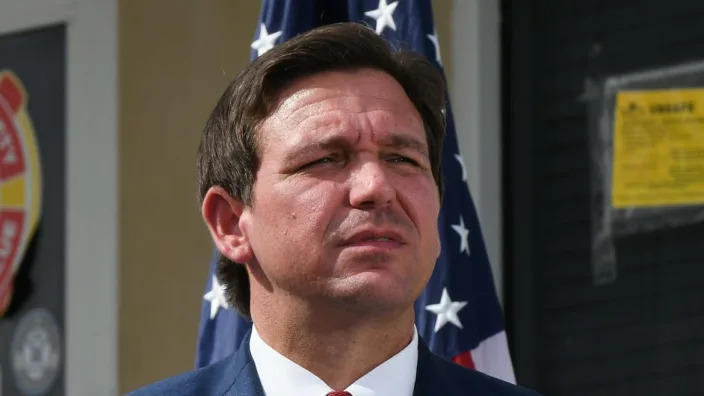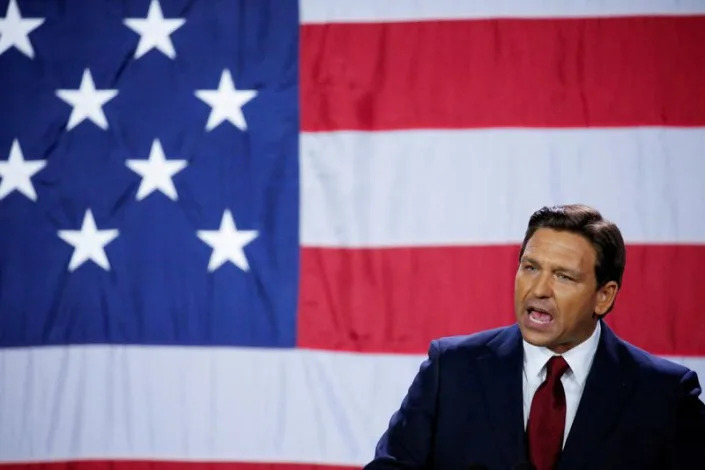Olympic gold medalist Bob Beamon calls out Gov. Ron DeSantis on race: He wants us to forget country's history
Tom D'Angelo, Palm Beach Post
Fri, January 20, 2023
Former US Olympian Bob Beamon speaks at Palm Beach State College during the 24th Annual Dr. Martin Luther King, Jr. Celebration on Jan. 19, 2023
LAKE WORTH BEACH — When Bob Beamon raised his right fist as he stood on the podium at the 1968 Olympics in Mexico City, he was expressing the need for change in a country mired in unrest and protests over racial and social injustices.
More than half a century later, Beamon is not satisfied with the progress. His message, as an inspirational speaker, not only is about perseverance and celebrating your accomplishments, but also one of disappointment.
"I turn on the TV to the news and there's some governor, I think he's from Florida," Beamon said Thursday at the annual Dr. Martin Luther King Celebration on the campus of Palm Beach State College. "We don't want you to talk about this. We don't want you to talk about that. We don't want you to know about the history of this country.
"So I said, 'Martin Luther King, do you hear me? You took us six steps forward. And when I turn on the news it felt like we took seven steps back.' "
Beamon, 76, is quite aware of Florida Gov. Ron DeSantis and his pushing back against critical race theory, just one example, he says, of the changing attitudes in recent years.
Florida education officials: African American Studies AP course 'lacks educational value'
New social studies textbooks: What reviewers are saying amid new 'parental rights' laws
"I feel that, 'Do we really get it? Do we really get what is really, really happening in this day and time?' " Beamon said, emotion in his voice. "So many of us have lost a life and what we've fought so hard for back in the '60s."
Under DeSantis, Florida has passed new “parental rights” laws, which include reviewing school textbooks to make sure they are free of lessons on critical race theory, “meaning the theory that racism is not merely the product of prejudice, but that racism is embedded in American society and its legal systems in order to uphold the supremacy of white persons,” according to the state Department of Education.
DeSantis also last year signed the Stop WOKE Act into law to restrict how colleges and workplaces talk about race, gender and sexuality.
Former US Olympian Bob Beamon speaks at Palm Beach State College
Beamon, a one-time track and field coach at Florida Atlantic University, is best known for that historic jump of 29 feet, 2.5 inches in Mexico City that earned him a gold medal while destroying the Olympic record by nearly 22 inches. It inspired the term "Beamonesque," defined as something spectacular and remarkable, or "an athletic feat so superior to what has come before, it is overwhelming."
But just as significant, that jump inspired him to follow the example set by teammates Tommie Smith and John Carlos, who just two days prior on that same podium, gave the Black Power salute by raising their black-gloved fists during the playing of the "The Star-Spangled Banner."
And it continues to inspire and energize Beamon to push forward with his message, one that he believes has gained more strength in recent years by this generation of activists such as LeBron James, Steph Curry and Colin Kaepernick.
"I think it's the same, but it's also a different way now of communicating," Beamon said about today's activists. "It's a highway of millions and millions of words of information that is coming through every day. And so how do we capture the souls of people? How do we relate to Curry and Kaepernick and LeBron James? How do you keep individuals' attention on so many things that are going on at one time?"
Beamon's activism started months before that day in Mexico City. In April of 1968, he was one of nine athletes kicked off the track and field team at the University of Texas-El Paso for boycotting a meet against Brigham Young just days following the assassination Dr. King. They were protesting the Book of Mormon's views on Blacks.
Two years earlier, that same school — then called Texas Western — became the first team with an all-Black starting five to win the NCAA Basketball Tournament, shocking a Kentucky team coached by Adolph Rupp and featuring Pat Riley.
"Dr. King gave us courage," Beamon said.
Beamon was in Austin, Texas, on the day Dr. King was assassinated in Memphis. He remembers walking into a restaurant following the meet and staring down the barrel of a shotgun.
The man holding the gun called Beamon a racial slur and told him to leave.
"There are things that happened, even prior to the death of Martin Luther King, that gave me a rude awakening," Beamon said.

Bob Beamon of the USA breaks the Long Jump World Record during the 1968 Olympic Games in Mexico City. Beamon long jumped 29 feet, 2 1/2 inches, winning the gold medal and setting a new world record.
Running with a gang
Beamon was born in Queens, New York. His mother died from tuberculosis when he was 8 months old, and he was raised by his grandmother. He joined a gang as a boy and was sent to an alternative school.
"My teachers were saying, 'You have one foot in the grave and one foot out of the grave,' " he said. " 'You are not going to be here too much longer.'
"For some reason … Maybe it was my mother and my father spiritually guiding me to something better."
He straightened out his life and was discovered in high school, where he set a national record in the triple jump and was second in the nation in the long jump. He first attended North Carolina A&T before transferring to Texas-El Paso.
In 1999, Beamon was hired by FAU as the director of development for track and field and coach of the inaugural men's and women's track teams. He left about two years later. He then was an associate athletic director at Chicago State University, served as an ambassador for the Special Olympics and worked with Miami-Dade Parks and Recreation.
In Miami, Beamon was drawn to the art community. He worked with Art of the Olympians, which showcases art by Olympians and Paralympians. He has designed ties, hats and scarves with Olympic themes.
Although his scholarship was revoked following the boycott, Beamon returned to UTEP following the Olympics to continue his studies and eventually he was accepted back into the community. Beamon, who graduated from Adelphi University with a degree in sociology, was inducted into the UTEP's athletic hall of fame in 2004 and a street is named after him in El Paso.
Today, Bob Beamon, who lives in Myrtle Beach, S.C., is much more than a man who could run fast and jump far, and whose name defines greatness.
"To best describe it," Beamon said about his role outside of athletics, "it was the beginning of something very special that changed the thinking of who we were.
"But we need to be mindful of the fact that we have to see a lot more. We have to educate a lot more people."
Tom D'Angelo covers sports for The Palm Beach Post and can be reached at tdangelo@pbpost.com. Follow him on Twitter @tomdangelo44.
This article originally appeared on Palm Beach Post: Bob Beamon takes on Ron DeSantis during MLK celebration event

Fabiola Santiago
Fri, January 20, 2023
Update: U.S. District Judge Robert L. Hinkle ruled Friday that Gov. Ron DeSantis’ suspension of Hillsborough State Attorney Andrew Warren violated the Florida Constitution and the First Amendment. He also said that allegations Warren prosecuted cases under what DeSantis called “woke ideology” were false.
The aspirational Florida governor waves the word “woke” around like a sword.
Woke this, woke that, wokeness, anti-woke, woke mob.
After his fiery inaugural speech on Jan. 3, in which the only other word used as much was Florida’s questionable “freedom,” a considerable number of readers — notably, not only from his but other states, too — asked me to put this question to Gov. Ron DeSantis:
What exactly is your definition of “woke,” sir?
“I know it has racial tones because it sounds like Ebonics. I know he uses it to incite his followers in that way. But what is he killing when he says, ‘Florida is where woke goes to die’?” wonders Pete from red-state Indiana.
I set out to find out.
And, although neither of DeSantis’ spokespeople would answer the question — or even confirm that they forwarded it to the governor, as is their job to do — the actions of his administration provided a clue this week.
Without bothering to give Floridians any details, DeSantis’ Department of Education rejected an Advanced Placement course on African-American studies that prepares students for the essential college-entry exam, the SAT.
The powers-that-be simply decided that, under state law — presumably the legislation Republicans dubbed the “Stop Woke Act” and allegedly protects the rights of white people to remain ignorant of American Black history — the course “lacks educational value.”
And so undefined “anti-wokeness” drives Florida education policy and attempts to tell employers how they can or can’t train their employees on issues of race and diversity. And neither the governor nor his staff feels compelled to explain their actions to citizens.
DeSantis ‘woke’ defined
Recently, however, the governor’s lawyer was forced to define “woke” in federal court by Jean-Jacques Cabou, the attorney for Hillsborough State Attorney Andrew Warren, a Democrat suing DeSantis for removing him from office for his “woke” pro-choice opinions.
When he announced Warren’s suspension, DeSantis referred to him as a “woke ideologue” who “masqueraded” as a prosecutor. He didn’t care that voters elected him twice.
Ryan Newman, DeSantis’ general counsel, said that the term means “the belief there are systemic injustices in American society and the need to address them.”
Indeed, there are inequities. DeSantis’ slate of anti-Black policies and actions reminds us.
For example: DeSantis’ different treatment of white Republican voters who knowingly committed fraud by twice voting for Donald Trump in the Villages and Black ex-felons who thought their rights were restored and were given voter registration cards by officials.
Guess which group was shackled, some men in their underwear, arrested SWAT-style by rifle-carrying officers and paraded in public on body cams?
Newman, once a law clerk for Supreme Court Justice Samuel Alito, said in court that DeSantis doesn’t believe that there are systemic injustices in the United States.
Hard to believe of a Yale and Harvard graduate.
Then, Newman stretched the truth with his own interpretation of woke: “To me, it means someone who believes that there are systemic injustices in the criminal-justice system, and on that basis, they can decline to fully enforce and uphold the law.”
Again, linking Blackness with lawlessness.
But, at least, Newman answered questions.
I had no such luck with DeSantis’ media reps.
“We have neither the time nor the desire to contribute to your opinion columns,” spokesman Bryan Griffin said in an email. “Please consider this response to stand in perpetuity.”
Does the “we” include the governor? I asked.
No answer.
Anti-woke costs Floridians
Anti-woke doesn’t come cheap.
Whether he’s policing Disney World’s diversity policies or persecuting college professors, DeSantis’ “anti-woke” obsession is costing the state government $17 million dollars in legal fees from the 15 lawsuits the new laws have drawn.
READ MORE: DeSantis’ culture wars grabbed headlines — and legal challenges that cost $17 million
In addition to the Warren trial, which, as of this writing, hadn’t been decided, he had lost, at least partially, a challenge to his “Stop Wrongs to Our Kids and Employees Act” restricting how race-related concepts can be taught at universities.
It may, in the long run, also cost him the presidency.
There’s a huge difference between appealing to a white-supremacist base in his home state and becoming the more moderate candidate that a post-Jan. 6, post-Trump America seems to prefer.
He’s also foolishly leading the state as if it were constantly in a state of war — and he’s scaring people who invest here.
Susan, a Northeast snowbird, bought a second home in Florida before COVID and planned to retire here with her husband, whose health requires warmer weather. They invested thinking Florida was a purple state.
But DeSantis scares her.
“How comfortable will a couple of proudly ‘woke Yankees’ be in Florida? I take DeSantis’ claim that ‘Florida is where woke goes to die,’ as a threat, and I personally have no interest in even spending winters there,” she writes me. “If it was up to me, I would not even step foot in Florida, given its current political climate.”
As a DeSantis watcher and recipient of his voters’ criticism, I know exactly what the governor’s anti-woke agenda means and his motivation: Stoking the base to constantly generate headlines that elevate his national profile: More Trumpian than Trump, but preppy racist.
Considering that DeSantis has turned his anti-Black agenda into Florida law, he makes the ex-president’s crass “my African-American friend” seem mild.
As for definition: If we know that woke, in DeSantis’ mind, refers to Black, then it “comes to die” here means the erasure of Blackness in Florida. And that makes all of us who care about Black history, want to read about it, learn it or teach it “the woke mob.”
The governor isn’t wearing the pointy white hood of African American studies textbooks.
But, given his aggressive racist behavior, does he need to?
Divya Kumar, Tampa Bay Times
Fri, January 20, 2023
In a statement Friday, the American Association of University Professors condemned Florida’s college presidents for committing this week to root out course content promoting “critical race theory or related concepts” by Feb. 1.
“The hypocrisy is glaring, as has been the case so often recently in Florida,” the statement said. “But the danger is very real. Censorship of ideas has absolutely no place in a democracy.”
The national organization, founded in 1915, stated it was “appalled at the blatant violation of academic freedom” and said it was exploring options, including an investigation and possible censure.
“In a democracy, higher education is a common good which requires that instructors have full freedom in their teaching to select materials and determine the approach to the subject,” the statement said. “Instead, the (Florida College System) presidents, while giving lip service to academic freedom, have announced their intention to censor teaching and learning by expunging ideas they want to suppress. By dictating course content, they are also usurping the primary responsibility for the curriculum traditionally accorded the faculty under principles of shared governance.”
The presidents of Florida’s 28 state colleges — including Hillsborough Community College, St. Petersburg College and Pasco-Hernando State College — released a statement on Wednesday that said in part they would not support “any institutional practice, policy or academic requirement that compels belief in critical race theory or related concepts such as intersectionality.”
Intersectionality is a recognition that discrimination and oppression in society are often interwoven, overlapping and complex. The concept aims to convey, for example, how Black men and white women can experience discrimination in ways that are both similar and different.
The college presidents further stated that any course material or instruction that includes discussion of critical race theory will present it as “one of several theories and in an objective manner.”
Their statement came as Gov. Ron DeSantis steps up his effort to rid Florida higher education of “trendy ideologies,” as he described it in his inaugural speech earlier this month.
His budget office has required the state’s colleges and universities to report how much they spend on activities related to critical race theory and diversity, equity and inclusion. And in a separate request, the office told universities to provide details on all the gender-affirming care they have provided since 2018.
In its response to the state, Hillsborough Community College stated that they don’t offer critical race theory courses and that student programs are inclusive to all. In a statement to the Tampa Bay Times on Thursday, an HCC spokesperson said the college supports the system statement and remains “committed to the values that are foundational to our mission.”
St. Petersburg College wrote in its response that it was “actively auditing” its website, programs and initiatives for changes that need to be made. In December, SPC President Tonjua Williams, who leads the council of college presidents, penned a letter to the Department of Education saying the colleges would support the ideas behind Florida’s new “Stop WOKE Act,” which is facing legal challenges.
Pasco-Hernando State College President Timothy L. Beard said in a statement he believed the presidents’ letter reflected “our core values of equity and academic excellence while maintaining adherence to state and federal educational requirements.”
Irene Mulvey, president of the national professors group, said college presidents should act as firewalls against outside influence on their institutions.
“This is a move toward authoritarianism, totalitarianism,” she said. “The fact that the Florida college presidents have, seemingly unprompted, gone along with this kind of move toward authoritarianism has raised the alarm bell to a five-alarm fire.”
Her organization is considering an investigation that could result in censure or sanctions against an administration or a system. In the past five years, six colleges and universities have been added to the group’s censure list.
She described the designation as “sort of like a public black eye” in the higher education community.
Ron DeSantis Is Deeply Invested In Florida's Regression. This Is Why Everyone In America Should Wake Up
Candace McDuffie
Thu, January 19, 2023
Florida Gov. Ron DeSantis seen during a press conference to announce the award of $100 million for beach recovery following Hurricanes Ian and Nicole in Daytona Beach Shores in Florida.
It looks like Republican Governor Ron DeSantis’ anti-critical race theory crusade continues. Most recently, his Florida administration made the decision to veto a new Advanced Placement course for high school students on African American studies.
CNN reported that in a January 12 letter to the College Board (which oversees AP courses), the Florida Department of Education’s Office of Articulation stated that the course is “inexplicably contrary to Florida law and significantly lacks educational value.”
It also said: “In the future, should the College Board be willing to come back to the table with lawful, historically accurate content, FDOE will always be willing to reopen the discussion.” Though this decision doesn’t necessarily surprise anyone, it still remains infuriating.
In 2021, Florida passed a law that banned teaching critical race theory, which ultimately was done to placate racist white people from acknowledging the violent founding of this country built on the backs of Black people. In addition, last year DeSantis enacted a bill limiting how schools can talk about race with students.
Not surprisingly, several Michigan Republicans are throwing support behind DeSantis to run for president in 2024, which has a disturbing likelihood of happening. His only Republican opponent at the moment is disgraced former president Donald Trump.
DeSantis has also stood proudly against vaccinations and mask-wearing since the onset of Covid. He shared a press release earlier this week that confirmed he’s pushing for legislation that will prevent employment decisions based on COVID-19 vaccination status. The bill would also prevent schools and businesses from requiring face coverings.
During a speech in Panama City a few days ago, DeSantis stated that requiring people to wear masks impeded on personal freedom. “It required us over the past few years to stand against major institutions in our society: the bureaucracy, the medical establishment, legacy media and even the president of the United States who, together, were working to impose a bio-medical security state on society,” he remarked.
The fact that DeSantis could become the Republican candidate for the 2024 presidential race is horrifying. On top of being anti-vax and pushing racist narratives in Florida classrooms, he has also championed anti-LGBTQ legislation. Though there isn’t really any single Republican politician worth bolstering, DeSantis’ candidacy ultimately means bad news for this country.
His investment in Florida’s regressive and bigoted policies serves as a precursor to what he would do to the entire country, if given the opportunity. DeSantis’ behavior—and the seemingly endless amount of support he receives for it—will also inspire other politicians around the country to emulate it.
Although he’s had his slew of opponents, DeSantis remains determined to wield his power and influence to uphold white supremacist structures. This has always been the goal of the GOP, though: to disenfranchise people of color politically, socially and economically, no matter what the cost.
The Root
Florida Explains Why It Blocked Black History Class—and It’s a Doozy
Alec Karam
Fri, January 20, 2023
Paul Hennessy/SOPA Images/LightRocket via Getty Images
The Florida Department of Education says it banned AP African American History because it teaches students about activism, intersectionality and encourages “ending the war on Black trans, queer, gender non-conforming, and intersex people,” according to a document the department sent to The Daily Beast.
Florida Gov. Ron DeSantis rejected a request from the College Board to provide the class in high school classes in the state Wednesday. The move comes in the same week the far-right Republican—who a judge just ruled violated free speech laws by firing a prosecutor for being “woke”—requested info on trans students from universities state-wide.
DeSantis’ administration further made their anti-LGBTQ stance known in their explanation for prohibiting the class, simply listing “Black Queer Studies” as a violation of state law.
A representative for DeSantis said the now-banned class “lacks educational value and historical accuracy” in a statement to The Daily Beast.
The document further admonishes the teaching of intersectionality, claiming it is “foundational to” Critical Race Theory, without explaining how.
The department also takes issue with topics advocating for reparations—a movement with the goal of helping recipients overcome generations of human rights violations.
“There is no critical perspective or balancing opinion in this lesson,” the document says of one topic devoted to the Reparations Movement.
The inclusion of acclaimed author bell hooks in the topic Black Feminist Literary Thought is also cited as a problem, apparently because hooks used the phrase “white supremacist capitalist patriarchy.”
DeSantis hasn’t been shy about his anti-“woke” stance, passing the STOP W.O.K.E. act in 2021, which banned the teaching of Critical Race Theory, even though the governor failed to prove it’s taught in public schools in the state.
The Department of Education says it is “willing to reopen the discussion” if the College Board can provide a class that abides by state law and is historically accurate, although the department’s statement doesn’t provide specific details of what the class teaches that is historically inaccurate.
“As presented, the content of this course is inexplicably contrary to Florida law and significantly lacks educational value,” the department said in a letter to the College Board.
The department apparently doesn’t want people to think DeSantis is against Black history, however. After all, according to department representatives, he specifically promotes teaching (some of) it.
“One example from his first term is HB 1213, passed and signed into law in 2020. This is a bill that requires all Florida students to learn about the Ocoee Massacre,” Cassie Palelis, press secretary for the Florida Department of Education, said in a statement.
The Daily Beast.
White House: Florida ban on African American studies course is 'incomprehensible'
WASHINGTON — Florida’s ban on teaching an advanced placement course on African American history is “incomprehensible,” White House press secretary Karine Jean-Pierre said on Friday, in the latest dispute between the Biden administration and Florida Gov. Ron DeSantis, a likely presidential nominee who has energized conservatives with his eagerness to engage in the culture wars.
Jean-Pierre’s statement comes a day after the public release of a letter Florida’s education department sent last week to the College Board, which administers AP courses and exams. The letter said that the new African American history course would not be taught in the state’s schools because of concerns that it would become, in the words of DeSantis spokesman Bryan Griffin, “a vehicle for a political agenda,” as furor over the announcement mounted.
For the most part, decisions about education are made on state and local levels, but political polarization and social media have effectively nationalized the conversation about schooling, especially when that conversation includes issues of gender and race. “It is not our place to direct or be involved in any school curriculum. But this is concerning,” Jean-Pierre said.
In a statement emailed to Yahoo News, DeSantis spokesman Bryan Griffin said the “study of African American history is not only permitted in Florida under [DeSantis] but required by law.”
“In fact,” Griffin said, “the teaching of African American History has been expanded in Florida since Governor Ron DeSantis took office.”
The decision on the African American history course appears to be part of DeSantis’s campaign to make Florida the state where “woke comes to die,” as the governor is fond of saying. Attorneys and other officials in his administration have defined wokeness as a reference to “systemic injustice,” particularly in the criminal justice system.
The dispute between the White House and DeSantis over education-related issues began at the height of the coronavirus pandemic, when the Florida governor resisted mask mandates for children in schools.
As the pandemic subsided, the animosity persisted.
Early last year, President Biden criticized DeSantis for what he called a “hateful” law that would make it difficult, if not impossible, to teach or discuss sexual orientation in the classroom. Although the law’s supporters said it was designed to protect young children from inappropriate materials and concepts, the measure’s language was vague enough to have a widespread chilling effect.
In March 2022, DeSantis oversaw passage of a new law that allowed parents to challenge school reading lists, course materials and library collections. The measure appeared to cater to a burgeoning movement of conservative parents angry at the state of American schools.
“They have banned more books in schools and libraries than almost every other state in the country,” Jean-Pierre said on Friday. In fact, Florida ranks second in the number of book bans implemented by states, according to a recent PEN America report. Texas is first.
Many of Florida’s educational policies in the last two years appear to have been guided by Christopher Rufo, a right-wing activist who emerged in 2021 as a standard-bearer in the educational culture wars. (Rufo was recently one of six DeSantis appointees charged with turning New College, a small liberal arts school, into a beacon of conservatism.)
In April, with Rufo at his side, DeSantis signed the Stop W.O.K.E. Act, which makes it almost impossible for educators to teach about racial or gender discrimination. He and Republican lawmakers — who control the state Legislature — have also mandated that civics education in the state focus on patriotism. Among the institutions allowed to review the civics guidelines was Hillsdale College, a conservative Christian institution. (Hillsdale is the model for the governor’s and Rufo’s vision for New College.)
Florida has 2.9 million public school students. Any curricular decisions made there are potentially consequential for educators and students in other states, especially as Republican governors seek to emulate the moves that have made DeSantis popular with the party’s base. Sarah Huckabee Sanders, Arkansas’s new and first female governor, recently attracted a top Florida education official to run her state’s schools.
Administered by the College Board, Advancement Placement courses allow high school students to earn college credit by doing college-level work. Conceived in the 1950s at Kenyon College, the AP program now has about 40 courses, from statistics to Chinese. More than 1.1 million high school students have taken at least one AP course annually in recent years.
The African American history AP course was introduced in August as a pilot project. Conservatives immediately expressed concern that it would be used to inculcate students with critical race theory, a concept that is as divisive and nebulous as wokeness — and seems also to connote, in the broadest sense, a concern for examining the legacy and persistence of racial injustices.
“I think people need to understand that critical race theory is not an element of this course,” a teacher involved in the pilot told the New York Times, pointing out that the contentious 1619 Project — a Pulitzer Prize-winning New York Times Magazine series that sought to reframe the American experience around slavery and racism but also faced some criticism from historians — was not part of the curriculum.
“There might be elements that cross over,” the teacher explained. “But this course is a comprehensive, mainstream course about the African American experience.”
According to a copy of the proposed syllabus published by a Florida news outlet, the course is a straightforward history lesson that covers the rise of African kingdoms, the advent of the transatlantic slave trade, the experience of enslavement in the American South, abolition and emancipation, the Harlem Renaissance, the civil rights movement and the challenges faced by African Americans today.
Many of the suggested texts are by canonical authors like the pioneering sociologist W.E.B. Du Bois and the writer James Baldwin, as well as Thomas Jefferson, a Founding Father who owned slaves. But reference to Kimberlé Crenshaw, who pioneered the concept of critical race theory, and other contemporary thinkers, appeared to provide conservatives like DeSantis with all the evidence they needed to dismiss the course outright as nothing more than an exercise in activism.
A factsheet compiled by the state Education Department and sent to Yahoo News also raises concerns with topics like Intersectionality and Activism, Black Queer Studies and the Reparations Movement, as well as with specific authors such as Angela Davis, bell hooks and Robin D.G. Kelley.
Last week, Florida’s education department notified the College Board that it would be prohibiting the teaching of the new course because “the content of this course is inexplicably contrary to Florida law.”
After the letter was made public on Wednesday it was immediately criticized by many educators. But conservatives who fear that mainstream American culture has been given over to progressive rhetoric and ideology cheered DeSantis, as they consistently have during his battles with Democratic politicians and corporations like Disney that have embraced progressivism.
The White House is aware of DeSantis’s rising clout and barely concealed presidential ambitions, and thus sees little downside in picking a fight with a figure many Democrats have come to regard as perhaps a bigger political threat than Donald Trump. (The former president has already announced that he will seek the presidency next year, and he too has come to view DeSantis as a threat.)
Jean-Pierre implied on Friday that the decision on African American history was motivated by racial animus. “And let’s not forget, they didn’t block AP European History, they didn’t block our music history, they didn't block our art history — but the state chooses to block a course that is meant for high-achieving students to learn about their history of arts and culture.”
In his statement, Griffin said Jean-Pierre was “demonstrably incorrect.”
Responding to what quickly became a national controversy, the state Education Department told the Daily Beast that it was open to revisiting the issue. “If the course comes into compliance and incorporates historically accurate content, the department will reopen the discussion,” a spokeswoman said.
Florida 'proudly' teaches African American history, official says, as he defends rejecting AP course
Republican Governor DeSantis
Sharon Bernstein
Fri, January 20, 2023 a
By Sharon Bernstein
(Reuters) - Florida's education chief on Friday defended the state's rejection of a proposed Advanced Placement course in African American Studies, saying the public schools already teach about racism and slavery, while lashing out at "woke indoctrination."
The rejection of the course was the latest in a series actions by the administration of conservative Republican Governor Ron DeSantis on issues that strike a nerve in the country's culture wars, including outlawing some educational efforts regarding racism, slavery and LGBTQ rights. DeSantis is widely expected to seek his party's nomination for the presidency in 2024.
"We proudly require the teaching of African American history," Florida Commissioner of Education Manny Diaz, Jr. posted on Twitter. "We do not accept woke indoctrination masquerading as education."
The program, which is in the pilot stage, was developed by the College Board, a non-profit that administers Advanced Placement tests that help high school students gain college credits.
Florida is one of several states that have banned public schools from teaching "Critical Race Theory," an academic framework that teaches that racism goes beyond individual prejudices and "is embedded in laws, policies and institutions that uphold and reproduce racial inequalities," according to the NAACP.
On Jan. 12, Florida sent a letter to the College Board saying the AP course violated Florida law and lacked educational value.
The White House on Friday condemned the move, with spokesperson Karine Jean-Pierre calling rejection of the course “incomprehensible.” She noted that Florida was not banning AP courses on European history and said the action was of a piece with earlier moves by DeSantis, including banning teaching young children about LGBTQ issues.
Diaz called the White House comments "lies" and released a chart showing the state's objections to the course.
Among the concerns were readings about intersectionality, the idea that discrimination can impact an individual in multiple ways if people are members of more than one marginalized group, a section on Black Queer Studies, a discussion of Black feminism, and a topic called Movements for Black Lives. A section on whether the U.S. should pay reparations to the descendants of enslaved people does not offer arguments against the idea, the chart says. It rejects a reading by 1960s radical Angela Davis, whom it called a "self-avowed" Communist.
"As submitted, the course is a vehicle for a political agenda and leaves large, ambiguous gaps that can be filled with additional ideological material," DeSantis' spokesman, Bryan Griffin, said in a statement to Reuters. "As Governor DeSantis has stated, our classrooms will be a place for education, not indoctrination."
If the course is amended to meet Florida's standards and comply with its laws, the state will reconsider, Griffin and Diaz said.
The College Board did not immediately respond to a request for comment from Reuters on Friday. But on Thursday, it said in a statement to Reuters that the course aims to "explore the vital contributions and experiences of African Americans." It is a humanities course and as such does not teach theory, the statement said.
(Reporting by Sharon Bernstein; Editing by Leslie Adler)
Florida blocks high school African American studies class

Florida Gov. Ron DeSantis speaks after being sworn in to begin his second term during an inauguration ceremony outside the Old Capitol on Jan. 3, 2023, in Tallahassee, Fla. DeSantis' administration has blocked a new Advanced Placement course on African-American studies from being taught in high schools, saying the class violates state law and that it is historically inaccurate.
ANTHONY IZAGUIRRE
Thu, January 19, 2023
TALLAHASSEE, Fla. (AP) — Florida Gov. Ron DeSantis' administration has blocked a new Advanced Placement course on African American studies from being taught in high schools, saying it violates state law and is historically inaccurate.
The state education department rejected the program in a letter last week to the College Board, which oversees AP classes.
Florida education officials did not specify exactly what content the state found objectionable but said, “As presented, the content of this course is inexplicably contrary to Florida law and significantly lacks educational value.”
“In the future, should College Board be willing to come back to the table with lawful, historically accurate content, (the education department) will always be willing to reopen the discussion," the letter continued.
In a statement, the College Board said, “Like all new AP courses, AP African American Studies is undergoing a rigorous, multi-year pilot phase, collecting feedback from teachers, students, scholars and policymakers.”
“The process of piloting and revising course frameworks is a standard part of any new AP course, and frameworks often change significantly as a result,” the statement read.
The College Board website describes the course as interdisciplinary, touching on literature, arts, humanities, political science, geography and science. The pilot program is debuting at 60 schools across the country before it expands to additional schools. The organization has been working on constructing the course for more than a decade, according to its website.
DeSantis, a potential 2024 GOP presidential candidate, has opposed what he calls liberal ideologies in schools, including lessons around critical race theory, which examines systemic racism and has become a frequent target of conservatives.
Last year the governor signed legislation dubbed the Stop WOKE Act that restricts certain race-based conversations and analysis in schools and businesses. The law bars instruction that says members of one race are inherently racist or should feel guilt for past actions committed by others of the same race, among other things.
More recently the governor's budget office called on state colleges to submit spending information on programs related to diversity, equity and inclusion and critical race theory, raising concerns of potential funding cuts around such initiatives.
Sharon Courtney, a high school teacher in Peekskill, New York teaching the African American studies course, said her students were "shocked" to learn Florida blocked the class. She described it as a factual African history course that also details what Africans experienced upon their arrival in North America.
“There’s nothing objectionable, it's history that hasn’t been traditionally taught in the United States in a K through 12 setting,” she said, “but it's also history that once known and understood could change race relations and improve them.”
Nick Papantonis
Florida Department of Education leaders are refusing to explain why the College Board’s new AP African American Studies (APAAS) class “lacks educational value,” one day after a letter informing the Board that the class couldn’t be taught in the Sunshine State was made public.
In a letter dated January 12 – right before the nation commemorated Martin Luther King Jr. day – the department’s Office of Articulation sent the board its decision, saying “this course is inexplicably contrary to Florida law and significantly lacks educational value.”
“In the future, should College Board be willing to come back to the table with lawful, historically accurate content, FDOE will always be willing to reopen the discussion,” the letter read.
APAAS was first offered this school year in a multi-year pilot project. Sixty high schools across the country were allowed to teach it, including a charter school in Tallahassee. The pilot was set to expand to other schools next year before being formalized in 2024.
Due to its status as a pilot, few course materials have been publicly released. Multiple broad course overviews posted by the various schools involved in the pilot describe the course as a part-history, part-culture evolution of African American culture over time, beginning in medieval Africa and ending with modern protest movements.
The descriptions promised a heavy focus on primary source documents throughout, as well as a focus on resistance movements and oppression.
“Intersectionality, which refers to how various systems of oppression overlap, will also be a key tenet of the class,” another school’s description read.
That sets it apart from the African American history classes commonly found in high schools. Florida law requires students learn about the topic, although not necessarily in a dedicated class.
“Instruction shall include the roles and contributions of individuals from all walks of life and their endeavors to learn and thrive throughout history … and the courageous steps they took to fulfill the promise of democracy and unite the nation,” Florida law reads. “Instructional personnel may facilitate discussions and use curricula to address, in an age-appropriate manner, how the individual freedoms of persons have been infringed by slavery, racial oppression… curriculum may not be used to indoctrinate or persuade students to a particular point of view.”
Florida’s new “Stop WOKE Act” restricts how teachers may address race and oppression in their classrooms.
The department’s attention to this issue may have come from the outlet that broke the news of the rejection, the National Review. Contributing Editor Stanley Kurtz has spent months railing against APAAS, taking aim at texts he said were being used in the class.
“APAAS clearly proselytizes for a socialist transformation of the United States,” he wrote last year. “The long and short of it is that APAAS promotes leftist radicalism. The sheer one-sidedness of the readings establishes that. The course’s political bias is so egregious that the presence or absence of [Critical Race Theory] laws is almost beside the point.”
Critical Race Theory is a graduate-level program that theorizes racism and racial bias is present in the structure of society and the legal system because the system was set up by white people. It definition has been twisted and broadened by social conservatives looking to rally voters to topics that deal critically with the issue of race. The “Stop WOKE Act” emerged because of that political push last spring.
In an emailed statement College Board representatives pushed back on the accusations of indoctrination and political bias.
“The course is designed to encourage students to examine each theme from a variety of perspectives, without ideology, in line with the field’s tradition of debates,” the statement read. “In the spring of 2024, the AP African American Studies course framework will be posted on the AP Program website after it reflects learnings from the pilot, so that anyone can read the course material directly and see the evidence-based content and skills that students learn in the course.”
The state’s ban was met with astonishment from the history community. Documents reported 100 college curricula and more than 130 professors were consulted during the design of the course over the last decade, including a during well-attended seminar for high school teachers involved in the pilot at Howard University this summer.
Some pointed out AP European History was still available for students to take, along with AP courses in Art History and various European and Asian languages.
“I find it hard to believe that a governor, state employees, or state politicians are also qualified historians who can say whether any AP history course has “historically inaccurate information.” Howard University History Department Chair Dr. Nikki Taylor said. “Only historians can make such calls, not politicians.”
Dr. Christopher Tinson, chair of the African American Studies department at St. Louis University, was involved in vetting the course curriculum. He said he wanted a class that didn’t begin the African American experience with slavery, and also wanted to focus on topics like how the Haitian Revolution helped expand the US.
He said he was disappointed by the state’s comments. At no point during the course’s development were corners cut, he explained, nor did the class teach Critical Race Theory to high schoolers, despite covering tough topics like racism and oppression.
He defended the course as a well-rounded effort to better prepare the next generation of scholars.
“We can’t continue to say that we want an informed citizenry that... that wants the best for each other, if we don’t understand the histories that people will carrying with them,” he said.
Divya Kumar, Tampa Bay Times
Thu, January 19, 2023
Florida’s 12 public universities plan to spend about $34.5 million on diversity initiatives and related efforts, according to records gathered at the request of Gov. Ron DeSantis’ budget office.
The records were assembled in response to a late December request that all state colleges and universities tally what they spend on diversity, equity and inclusion efforts and activities related to critical race theory. Since then, the governor has criticized universities for accommodating “trendy ideologies” and begun what some are calling an effort to “recapture” higher education from “woke” influence.
In addition to asking for diversity records, the DeSantis administration has restructured the board of trustees at New College, a progressive school in Sarasota, and is requiring the 12 universities to detail the treatment they have provided since 2018 for people seeking gender-affirming care.
The first batch of university responses shows that $20.7 million — or about 60 percent of what universities spend on diversity efforts — comes from the state, with the remainder from sources like the federal government.
A 35-page document details expenses ranging from a $63 graduation ceremony for LGBTQ students at Florida Gulf Coast University to a $4.1 million Upward Bound program at the University of South Florida for low-income, first-generation college students. State funds did not go toward either of those.
The University of South Florida spent the most of any school — a total of $8.7 million, with about $2.5 million coming from the state. Other expenses included the university’s supplier diversity program, which was touted for creating economic opportunities for minority-owned local businesses and trainings; a handful of general education courses; and funding for USF’s Office of Diversity, Equity and Inclusion, which is in the process of hiring a chief diversity officer.
The university’s latest strategic plan, approved by its trustees and the state Board of Governors, adopted social justice as one of its main tenets.
Florida A&M University spent the highest amount of state funds: $4.1 million. The historically Black university in Tallahassee listed among its expenses a research center and museum for Black archives, a center for disability access and the Center for Environmental Equity and Justice, which was funded into existence by the Legislature in 1998.
The University of Florida spent a total of $5.3 million, of which $3.3 million came from state funds.
Florida State University spent $2.45 million, with $2.25 million coming from the state. Among the programs that received money: FSU’s Power of We civil discourse initiative; NCAA compliance training; and 35 courses, including Topics in Buddhism, Black Women in America and Classical Perspectives in Dance.
Florida International University spent $3.1 million, with $2.25 million from the state, and the University of Central Florida spent $4.47 million, including $2.3 million in state funds. Expenses at UCF included the Institute for Diversity and Ethics in Sport, which issues a national race and gender report card.
The Department of Education has yet to release records on diversity efforts at the state’s 28 public colleges. But on Wednesday the department said all of the college presidents issued a joint statement that “rejects the progressivist higher education indoctrination agenda.”
Responding to requests by the Tampa Bay Times, St. Petersburg College and Hillsborough Community College provided records of their spending on diversity initiatives.
St. Petersburg College spent $1.8 million, of which $217,413 came from the state. The majority of expenses were for an initiative funded by the Helios Foundation that supports Black male students, the most underrepresented demographic in higher education.
Hillsborough Community College spent $552,029, of which $40,555 came from the state. The college said it does not offer studies in critical race theory, adding that its student events and programs are all-inclusive.
Divya Kumar covers higher education for the Tampa Bay Times, in partnership with Open Campus.
(Editor’s Note: A previous version of this story contained incorrect information on the number of state colleges in Florida.)
